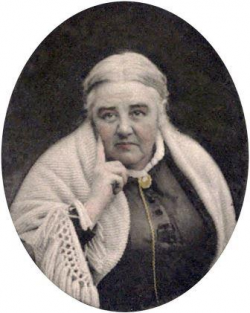Sophia Jex-Blake

- Born
- 21 January 1840
- Died
- 7 January 1912 (age 71)
Sophia Jex-Blake was one of the first female doctors in the UK and a leading campaigner for medical education for women. She set up two medical schools for women and also founded a women’s hospital.
Against the wishes of her parents, Jex-Blake enrolled at Queens College in London in 1858. A year later, she was offered a post there as mathematics tutor. She worked in this role without pay, as her father refused her permission to accept a salary. During this period, she spent some time living with Octavia Hill and her family, and also became friends with Elizabeth Garrett.
In the early 1860s, Jex-Blake travelled widely, teaching in Germany and then going to America, where she learnt about women’s education and was influenced by developments in co-education. In Boston, at the New England Hospital for Women and Children, she worked as an assistant to the pioneer female physician Lucy Sewell, and decided to become a doctor.
In 1869, she returned to the UK, and published her essay, Medicine as a profession for women, in which she argued that female doctors should treat women who needed them.
No English medical school would agree to take her, but she persuaded Edinburgh University Medical School to accept her. However, the university said it could not afford to hold lectures just for her (at the time it was unthinkable that she could attend the same lectures as the men). She found six other women to join her, to fund their own segregated lectures, and the group became known as the Edinburgh Seven.
They faced a lot of opposition from lecturers, students and locals, as well as legal difficulties. When they tried to attend an anatomy exam in 1870, they were met by a mob of students who slammed the door in their faces, however one sympathetic student ushered them in.
She was one of the people who really do live…She had to find her self, to find her way, to find her work.
Margaret Todd, 1918, The life of Sophia Jex-Blake.
The women passed their examinations but medical degrees were only given to men, so the British Medical Association refused to register them as doctors. This case generated a lot of publicity and they gained the support of an MP, Russell Gurney, who campaigned for women’s rights. He put forward a bill that allowed (but did not compel) medical training bodies to treat women and men equally. This bill was put through Parliament in August 1874.
In the same year, Jex-Blake helped to establish the London School of Medicine for Women. In 1877, she qualified as Doctor of Medicine in Bern and passed further exams at the King’s and Queen’s College of Physicians in Ireland, so that she could registered with the General Medical Council. She later returned to Edinburgh where she set up a private practice and outpatients clinic for poorer patients in her home, which later became the Bruntsfield Hospital for Women. In 1886 she set up the Edinburgh School of Medicine for Women.



